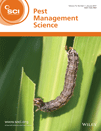BACKGROUND. RNA interference (RNAi) technology can potentially serve as a suitable strategy to control the African sweet potato weevil Cylas puncticollis (SPW), which is a critical pest in sub-Saharan Africa. Important prerequisites are required to use RNAi in pest control, such as the presence of an efficient RNAi response and the identification of suitable target genes. RESULTS. Here we evaluated the toxicity of dsRNAs targeting essential genes by injection and oral feeding in SPW. In injection assays, 12 of 24 dsRNAs were as toxic as the one targeting Snf7, a gene used commercially against Diabrotica virgifera virgifera. Three dsRNAs with high insecticidal activity were then chosen for oral feeding experiments. The data confirmed that oral delivery can elicit a significant toxicity, albeit lower compared with injection. Subsequently, ex vivo assays revealed that dsRNA is affected by degradation in the SPW digestive system, possibly explaining the lower RNAi effect by oral ingestion. CONCLUSION. We conclude that the full potential of RNAi in SPW is affected by the presence of nucleases. Therefore, for future application in crop protection, it is necessary constantly to provide new dsRNA and/or protect it against possible degradation in order to obtain a higher RNAi efficacy.
RNAi-based gene silencing through dsRNA injection or ingestion against the African sweet potato weevil Cylas puncticollis (Coleoptera: Brentidae).
Citation: Prentice, K.; Christiaens, O.; Pertry, I.; Bailey, A.; Niblett, C.; Ghislain, M.; Gheysen, G.; Smagghe, G. 2017. RNAi-based gene silencing through dsRNA injection or ingestion against the African sweet potato weevil Cylas puncticollis (Coleoptera: Brentidae). Pest Management Science. (USA). ISSN 1526-498X. 73(1):44-52.
2016-12-13
GENETIC RESOURCES, SWEETPOTATO AGRI-FOOD SYSTEMS, SWEETPOTATOES
journal_article

